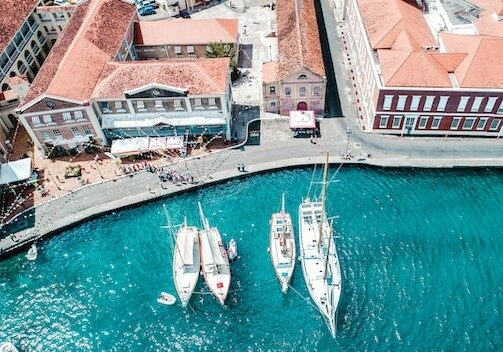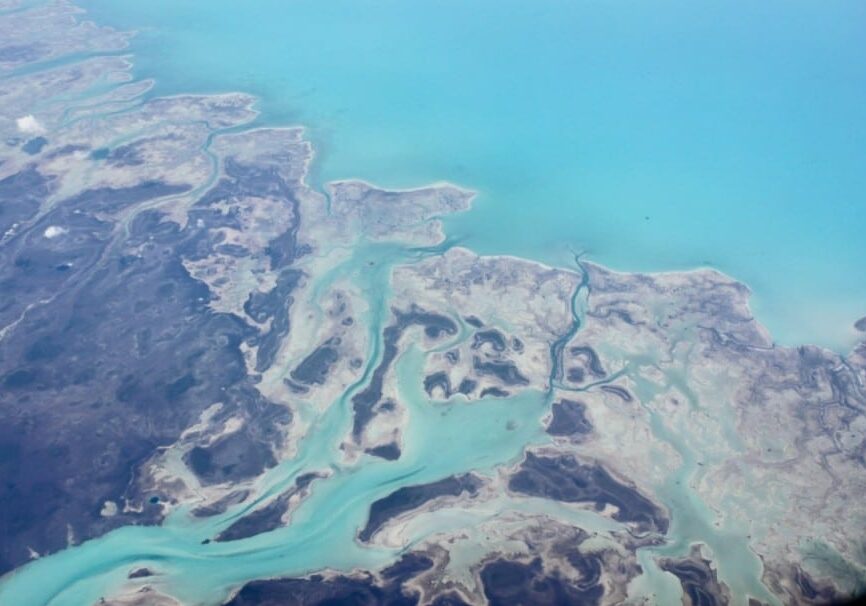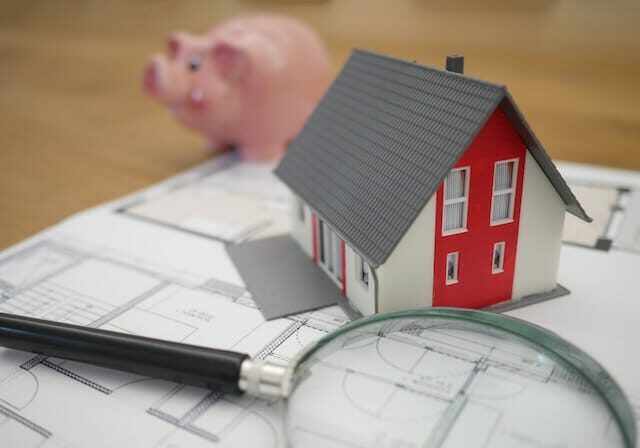A home in the Caribbean – with its year-round tropical climate and golden sunshine – does not only have to be an occasional getaway for the winter months. Purchasing a home here is an opportunity for you to make your dream of owning a home in paradise a reality. Navigating the process of becoming a homeowner in the Caribbean can be challenging, which is why we’ve put together this helpful guide to buying property in the Caribbean.
In this guide, we’ll discuss the Caribbean property market, the eligibility for foreign investors in real estate, the purchasing process, Caribbean property prices, and more.
The Caribbean Real Estate Market
The Caribbean is a large region comprising over 700 islands that collectively divide into 30 territories. Islands in the Caribbean all have different climates, economies, legal systems, cultures, and political landscapes, all of which should be considered when buying a house in the Caribbean.
You’ll find a tropical climate in the Caribbean. The main characteristics of this type of weather are year-round warmth, humidity, and sun. What you’ll also find are two main seasons, namely the wet and dry seasons.
An important aspect of the weather is the fact that the Caribbean experiences hurricanes, often affecting Caribbean residents or those with vacation homes. For this reason, it is essential before signing a purchase agreement that the homes are hurricane-proof to protect your investment and insure your safety during hurricane season. Nevertheless, Caribbean countries like Costa Rica and Grenada are located outside the hurricane belt, making them appealing for Caribbean property ownership.
Based on encouraging data from Statista, the Caribbean real estate market is poised for substantial growth, with a forecasted annual growth rate of 4.49 percent from 2024 to 2029, reaching a total market value of $2.69 billion.
The Process of Buying Property in the Caribbean
The process of buying property in the Caribbean varies among the islands thanks to the influence of legislation from different countries. For instance, in English-speaking regions like Antigua, Barbados, and the Cayman Islands, the purchasing process is influenced by British law. In contrast, in the French Caribbean territories such as St Barts, St Martin, and Martinique, the buying process is defined by French law.
Due to these variations, it is highly beneficial to consult with an attorney who is familiar with the purchasing process specific to your chosen area and who can provide professional guidance and advice before you proceed with the purchase of a property.
Caribbean passport holders can buy property in the Caribbean without restrictions. Foreigners must obtain an Alien Landholding License (ALHL) to buy a residential or commercial property in the Caribbean. However, five countries in the Eastern Caribbean allow foreign nationals to purchase property without an ALHL through their Caribbean citizenship by investment programs. In St Lucia investors make a property purchase valued at least $300,000 in approved real estate developments to obtain St Lucia real estate citizenship.
Caribbean Real Estate: What are your options?
The Caribbean offers a diverse range of property types for sale and rent, from affordable condos and apartments to boutique hotels, luxury villas, resorts, and private island retreats.
If you’re in the market for a beachfront villa, why not look to the west coast of Barbados, also known as the Platinum Coast? Known for its stretch of white sandy beach and clear, warm waters, this coast is ideal for families, romantic getaways, and luxury real estate. You’ll also find a taste of luxury in locations such as the Bahamas, the Cayman Islands, St Barts, and Turks and Caicos Islands. If you’re more of a sailing enthusiast, you should consider the Bahamas, the British Virgin Islands, the Grenadines, Antigua, St Lucia, St Maarten, or the US Virgin Islands.
If you’re into water activities, there are several Caribbean islands that should be top of your list, namely the east coast of Barbados, the northern coast of the Dominican Republic, Martinique, and Puerto Rico, particularly if you like to surf. Scuba divers may prefer Belize, Bonaire, Grenada, or Roatan, as their waters are home to a variety of stunning marine life.
If you’re looking for investment properties that provide a route to second citizenship, then you should consider Antigua and Barbuda, Dominica, Grenada, St Kitts and Nevis, and St Lucia, the only islands in the Caribbean that run citizenship by investment programs. Finally, if you are in search of a more secluded and tranquil escape, look to islands such as Bequia, Dominica, Montserrat, or Saba.
Caribbean Properties for Sale
St Kitts and Nevis: Sustainable, Caribbean-style cottages with panoramic views of the Caribbean Sea and Mount Liamiga are available in St Paul’s Belmont Farm Resort from $450,000. An advantage of buying a Caribbean property for sale in this development is the option to obtain St Kitts and Nevis real estate citizenship by investment.
Turks and Caicos Islands: 7th Heaven Properties has a one-bedroom Laguna villa for sale. It is a stone’s throw from the beach in Sailrockm South Caicos. Properties in the area are in high demand, and this villa has an asking price of $1.5 million.
Bahamas: A two-bedroom condo is for sale through Sotheby’s International Realty in Harbour Island, Eleuthera. The property, which is listed for $600,000, is part of the Valentine’s Beach Resort.
US Virgin Islands: REMAX Caribbean has listed a four-bedroom villa with a lot size of over 15,000 square feet for $425,000. The property is located in Diamond, St Croix, and can be used as a primary residence or commercial investment property.
Pros and Cons of Buying Property in the Caribbean
Owning your dream property on an idyllic Caribbean island is certainly within reach, and while it may sound like a perfect situation, it is important to have a realistic idea of what to expect when acquiring real estate as a investment in the Caribbean. Owning real estate abroad comes with its advantages and disadvantages, and the Caribbean is no different. So, in this section, we’ve outlined some of the pros and cons of Caribbean property investment.
 Pros
Pros

Affordability: The Caribbean caters to a range of budgets, with everything from luxury resorts to affordable property. When it comes to more affordable properties, there are many Caribbean islands – such as Dominica and St Lucia – where your property search will turn up a variety of budget-friendly options.
Tourist market: Many Caribbean destinations are popular stops for tourists from all over the world. Foreign buyers looking to take advantage of the thriving tourist market will find that earning rental income from a rental property can be quite a profitable venture.
 Cons
Cons
Natural disasters: While the Caribbean is a tropical paradise, certain islands are more prone to natural disasters such as Caribbean hurricanes and earthquakes. Owning property on one of these islands could result in unexpected costs from weather damage. On the other hand, investing in property reinforcement/protection measures early on can help minimize these costs down the line.
Cost of living: While some areas in the Caribbean offer an affordable cost of living, others can become quite expensive. It is important to research the cost of groceries, restaurants, transport, etc., when choosing the best Caribbean island to buy property on.
Limited infrastructure: While foreign investors can generate income from Caribbean rental properties, the region’s limited infrastructure can pose challenges in terms of property management and maintenance, potentially leading to higher operational costs and logistical difficulties.
Property Prices in the Caribbean
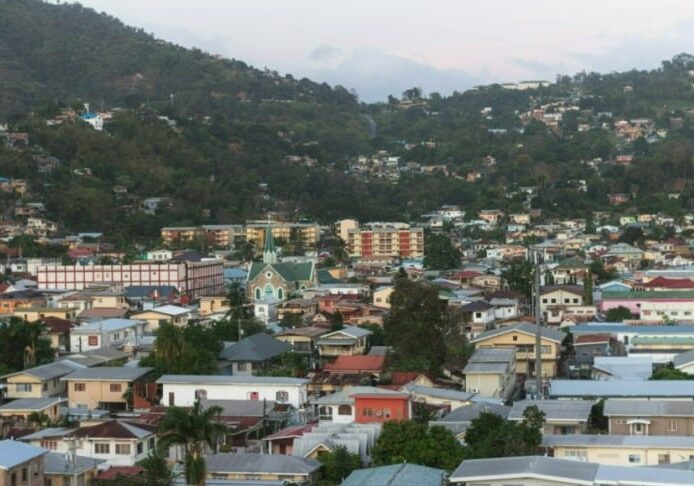
If you’re looking for more luxurious Caribbean real estate investments, you may find what you’re looking for in locations like Anguilla, Barbados, the Cayman Islands, and the Turks and Caicos islands with prices from $1 million to $5 million. Here, you’ll be able to find fantastic beachfront homes for sale, allowing you to wake up each day with a view of the sparkling blue ocean.
Typically, the price per square meter of an apartment in the Caribbean is more affordable the further away you move from the city centers and financial capitals. When doing your research, it can be beneficial to use real estate websites to get an idea of the types of properties available, as well as the prices they tend to be listed for. You can also speak to local real estate professionals who will be able to give you expert advice tailored to your circumstances.
How to find your Caribbean home
If you’re feeling a bit overwhelmed at the prospect of finding your dream vacation home or rental property, you’re not alone. Navigating the real estate market and buying process in a foreign country can be tricky. That’s why we recommend using the services of a real estate agent with expert knowledge of the local market, processes, and laws. You can also use real estate websites to conduct searches and gain a realistic idea of what is available.
What is the cheapest island to buy Caribbean real estate?
Budget is often one of the most important factors when buying property, particularly when relocating to a new country. Fortunately, the cheapest Caribbean islands to live on will meets your budgetary requirements when buying property in the Caribbean.
It is best to speak to a real estate professional who is familiar with the local markets and can advise you on where to find the most affordable property in the Caribbean. In general, however, locations like the Dominican Republic and Jamaica offer real estate options at affordable prices without compromising the value you can get for your money. For example, the price per square meter to purchase an apartment in the Dominican Republic can range between $1,000 and $1,500. In Jamaica, this will cost anywhere between $2,000 and $2,200 per square meter.
If you are interested in purchasing property through one of the Caribbean’s citizenship by investment programs, you can look at real estate in Antigua and Barbuda, Dominica, or St Kitts and Nevis. According to Numbeo, the price per square meter to buy real estate in Antigua and Barbuda ranges between $4,450 outside the city center and $6,000 in the city center. Here, you’ll find many property types on offer, including beachfront villas.
In St Kitts and Nevis, this changes to around $4,000 outside the city center and $5,000 in the city center. In Dominica, real estate prices drop to as low as $500 per square meter but can reach $5,000 depending on the location. In fact, you’ll find that prices are lower in Dominica than in other Caribbean islands.
The best place to find property for sale in the Caribbean will depend on factors such as the type of lifestyle you want to lead, your budget, your reason for relocating, and more.
Real Estate Ownership in the Caribbean Region: Can foreigners buy property?
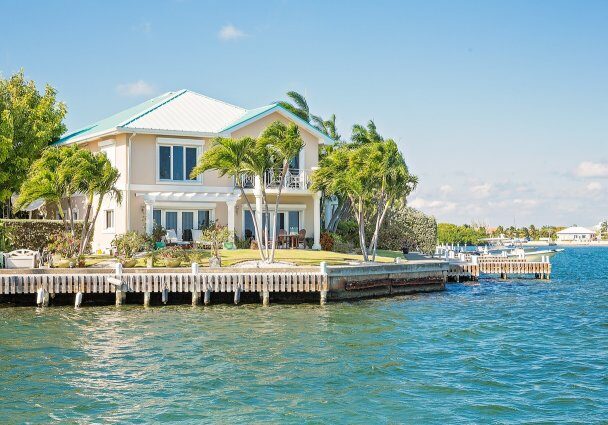
You will also need to consider how you will finance the purchase of the property, as well as any fees you may incur. For example, you will need to factor in the cost of services when using a real estate agent, lawyer, stamp duty (transfer taxes), and other fees over and above the purchase price of the property. Furthermore, if you are looking to take out a mortgage in order to purchase a property, you will need to obtain pre-approval from a lender before beginning your search for Caribbean real estate.
There are a number of lenders that offer mortgages to foreign buyers in the Caribbean, so you will need to determine which institution is the right fit for you. Mortgage loans are typically for a period of 15 to 20 years, and lenders consider factors such as your country of residence, the price of the property, the island on which the property is located, and the loan-to-value (LTV) ratio.
The purchasing process may vary slightly from island to island, which is why it is essential to employ the services of a lawyer who is familiar with the real estate laws specific to the location of your property.
Caribbean Citizenship by Real Estate Investment
One of the biggest appeals of the Caribbean is obtaining citizenship by buying their perfect property through and investment program. Caribbean property investors can qualify for Antigua and Barbuda, Dominica, Grenada, St Lucia, or St Kitts and Nevis citizenship through buying approved property.
Why use Global Citizen Solutions?
Global Citizen Solutions is a multidisciplinary firm offering bespoke residence and citizenship solutions in Europe and the Caribbean. In a world where the economy and politics are unpredictable, having a second citizenship opens up opportunities and creates flexibility for you and your family.
So, why work with Global Citizen Solutions to obtain Caribbean citizenship?
- Global approach by local experts: We are corporate members of the Investment Migration Council, with local expertise in all five Caribbean CBI programs.
- 100 percent approval rate: We have never had a case rejected and will offer you an initial, free-of-charge, due diligence assessment before signing any contract.
- Independent service and full transparency: We will present to you all the investment options available, and all expenses will be discussed in advance, with no hidden fees.
- An all-encompassing solution: A multidisciplinary team of immigration lawyers, investment specialists, and tax experts will take into consideration all your and your family's mobility, tax, and lifestyle needs.
- Confidential service and secure data management: All private data is stored within a GDPR-compliant database on a secure SSL-encrypted server.

Frequently Asked Questions about Buying Property in the Caribbean
Can anyone buy property in the Caribbean?
In general, most places in the Caribbean allow real estate to be purchased by both locals and foreign individuals. However, some locations may have certain restrictions in place or bureaucracy and cultural differences that cause the process to be more drawn out.
Which Caribbean island is best for investment?
There are many locations in the Caribbean that offer fantastic opportunities for real estate investment. In particular – due to their easier route to citizenship through economic citizenship. Antigua and Barbuda, Dominica, Grenada, St Kitts and Nevis, and St Lucia are some of the best islands for investment. The Cayman Islands is also an ideal choice for buying real estate in Caribbean islands due to its stable property property, wealth, and political stability.
Are there any restrictions on the type of property foreigners can buy in the Caribbean?
There is no universal law regarding the property types foreigners can own in the Caribbean, as each country has its specific laws and regulations. Foreigners are generally permitted to purchase and own all types of Caribbean property, including condos, vacation homes, and commercial properties. Certain zoning restrictions, such as protected areas, designated agricultural zones, or military zones, may apply.
How is property ownership taxed in the Caribbean?
Annual property tax in the Caribbean varies from one country to another. Besides stamp duty, tax havens such as the Cayman Islands do not impose property tax. In contrast, other Caribbean countries like Grenada impose an annual property tax of up to 0.8 percent of the property’s value.
What are the environmental considerations when buying coastal or beachfront properties in the Caribbean?
Several environmental factors should be considered when purchasing Caribbean coastal or beachfront properties. An assessment of the property’s vulnerability to natural hazards such as hurricanes should be made, which are amplified in coastal areas. Land erosion is another risk that coast properties in the Caribbean are subject to. Lastly, property buyers should engage a reputable lawyer to thoroughly review title deeds, as numerous regulations are implemented to enforce zoning restrictions aimed at safeguarding coastal areas and curbing over-development, thereby mitigating adverse environmental effects.

